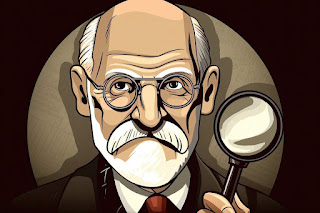Sigmund Freud, the renowned psychoanalyst, dedicated his life to unraveling the mysteries of the human mind. His theories on the unconscious, desires, and motivations provide a unique lens through which we can understand the reasons behind human behavior. Applying Freud's insights to the realm of gambling allows us to delve into the depths of the psyche and uncover the underlying drives that lead individuals to partake in this risky pastime.
According to Freud, human behavior is strongly influenced by unconscious desires, instincts, and unresolved conflicts. Applying this perspective to gambling, Freud would argue that the reason individuals engage in this activity lies in the fulfillment of deep-seated psychological needs.
Firstly, Freud would assert that gambling serves as an outlet for individuals to express their unconscious desires and fantasies. The unpredictable nature of gambling creates an environment where individuals can indulge in the excitement and anticipation of uncertain outcomes. By placing bets and taking risks, gamblers tap into their primal instincts, seeking pleasure and gratification in the possibility of a significant win. Freud would argue that the allure of gambling lies in the unconscious wish for liberation from societal constraints and the pursuit of immediate pleasure.
Furthermore, Freud would analyze gambling from the perspective of unconscious motivations and unresolved conflicts. He believed that human behavior often stems from unresolved psychological issues that manifest in various ways. Gambling, for many, becomes a coping mechanism—an escape from the pressures of everyday life. Freud would contend that individuals may turn to gambling as a means to alleviate anxiety, stress, or emotional pain. By immersing themselves in the world of gambling, individuals momentarily distract themselves from their internal struggles, finding solace and temporary relief from their unresolved conflicts.
Freud would also examine gambling through the lens of psychosexual development. He proposed that human beings progress through various stages of sexual development, and unresolved conflicts at any of these stages can impact adult behaviors. In the case of gambling, Freud might argue that the act itself holds symbolic meaning, representing a displacement of sexual energy or a desire for risk-taking associated with unresolved conflicts related to sexuality. For some individuals, gambling may serve as a substitute for the excitement and pleasure they seek but are unable to find in other areas of their lives.
Additionally, Freud's theories on the unconscious mind would shed light on the role of unconscious defense mechanisms in gambling behaviors. Freud proposed that defense mechanisms, such as repression and denial, serve to protect individuals from distressing thoughts and emotions. Applied to gambling, Freud would suggest that some individuals may engage in this activity to repress or deny deeper emotional conflicts or traumas they may be experiencing. Gambling serves as a way to divert attention away from painful experiences or feelings, providing temporary relief from psychological distress.
In conclusion, Freud's psychoanalytic perspective provides a thought-provoking framework for understanding the motivations behind gambling. According to Freud, gambling fulfills deep-seated psychological needs, such as the pursuit of pleasure, the escape from internal conflicts, and the expression of unconscious desires. By analyzing gambling through the lenses of unconscious motivations, unresolved conflicts, psychosexual development, and defense mechanisms, we gain a deeper understanding of why individuals engage in this risky behavior. While Freud's theories may not provide a comprehensive explanation for every gambler's motivations, they offer valuable insights into the complex interplay between the human psyche and the allure of gambling.
Photo: Pixabay (free)
